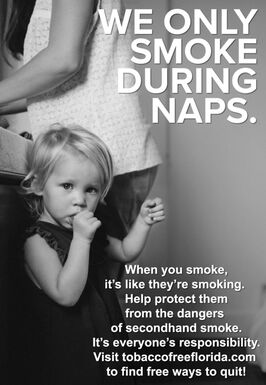QuitDoc Foundation
Smoking During Pregnancy
help us reduce the impact of tobacco on babies!
Smoking in Pregnancy from No-Tobacco on Vimeo.
Is smoking while pregnant harmful?
It is never safe to smoke.
Smoking when you are pregnant affects the placenta, which is the source of your baby’s food and oxygen. Certain chemicals from your smoking, such as nicotine and carbon monoxide, travel from your bloodstream into the baby’s bloodstream through the placenta. Nicotine increases your baby’s heart rate, and the carbon monoxide lowers the amount of oxygen available to your growing baby. These chemicals increase the chances that your baby will grow poorly, which can lead to miscarriage, premature birth, low birth weight, and certain birth defects such as cleft lip or cleft palate.
Additionally, school-aged children whose mothers smoked during pregnancy are at greater risk of learning problems and Attention Deficit Hyperactivity Disorder (ADHD).
Finally, these children are more likely to become smokers themselves later in life!
Pregnant women who smoke should quit – if not permanently then at least through their pregnancy.
It is never safe to smoke.
Smoking when you are pregnant affects the placenta, which is the source of your baby’s food and oxygen. Certain chemicals from your smoking, such as nicotine and carbon monoxide, travel from your bloodstream into the baby’s bloodstream through the placenta. Nicotine increases your baby’s heart rate, and the carbon monoxide lowers the amount of oxygen available to your growing baby. These chemicals increase the chances that your baby will grow poorly, which can lead to miscarriage, premature birth, low birth weight, and certain birth defects such as cleft lip or cleft palate.
Additionally, school-aged children whose mothers smoked during pregnancy are at greater risk of learning problems and Attention Deficit Hyperactivity Disorder (ADHD).
Finally, these children are more likely to become smokers themselves later in life!
Pregnant women who smoke should quit – if not permanently then at least through their pregnancy.
I am pregnant and I smoke. Is it too late to quit?
If you are pregnant, it is never too late to quit smoking. There are benefits to quitting smoking at any stage of your pregnancy. Quitting as soon as possible will help protect you and your baby from some health problems, such as low birth weight.
If you are pregnant, it is never too late to quit smoking. There are benefits to quitting smoking at any stage of your pregnancy. Quitting as soon as possible will help protect you and your baby from some health problems, such as low birth weight.

Is it harmful to smoke again after my baby is born?
You might think it is safe to start smoking again after your baby is born, but that is not true. If you start to smoke again, your newborn baby will be breathing smoke-filled air caused by your smoking. This is called secondhand smoke, which comes with its own set of risks.
The scariest problem is an increased risk of Sudden Infant Death Syndrome (SIDS), which used to be called “crib death”. This mysterious problem in which infants die in their sleep happens three times more often in homes where someone smokes.
Also, babies and toddlers exposed to the chemicals in second hand smoke are more likely to have health problems. They tend to be sick from respiratory infections, such as bronchitis and pneumonia, much more often than children in homes where no one smokes. These illnesses tend to be more severe and last longer as well, leading to more doctor’s visits and hospitalizations.
Finally, babies and children with asthma have more asthma attacks when they live in a home where someone smokes. These asthma attacks last longer and are more severe, again leading to more doctor’s visits and hospitalizations.
These problems will happen if your baby is exposed to any smokers in the home. So, even if you quit smoking, you need to protect your baby from ALL secondhand smoke! Do not let anyone, including relatives, to smoke near your child in your home or car. Be sure that any childcare providers, including grandparents, do not smoke around your baby. Do not take your baby to indoor public places, including restaurants, that allow smoking, even if that smoking is limited to outdoor seating areas.
You might think it is safe to start smoking again after your baby is born, but that is not true. If you start to smoke again, your newborn baby will be breathing smoke-filled air caused by your smoking. This is called secondhand smoke, which comes with its own set of risks.
The scariest problem is an increased risk of Sudden Infant Death Syndrome (SIDS), which used to be called “crib death”. This mysterious problem in which infants die in their sleep happens three times more often in homes where someone smokes.
Also, babies and toddlers exposed to the chemicals in second hand smoke are more likely to have health problems. They tend to be sick from respiratory infections, such as bronchitis and pneumonia, much more often than children in homes where no one smokes. These illnesses tend to be more severe and last longer as well, leading to more doctor’s visits and hospitalizations.
Finally, babies and children with asthma have more asthma attacks when they live in a home where someone smokes. These asthma attacks last longer and are more severe, again leading to more doctor’s visits and hospitalizations.
These problems will happen if your baby is exposed to any smokers in the home. So, even if you quit smoking, you need to protect your baby from ALL secondhand smoke! Do not let anyone, including relatives, to smoke near your child in your home or car. Be sure that any childcare providers, including grandparents, do not smoke around your baby. Do not take your baby to indoor public places, including restaurants, that allow smoking, even if that smoking is limited to outdoor seating areas.



